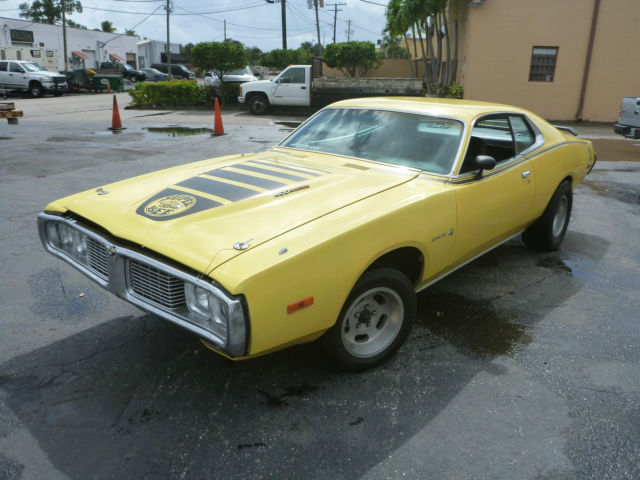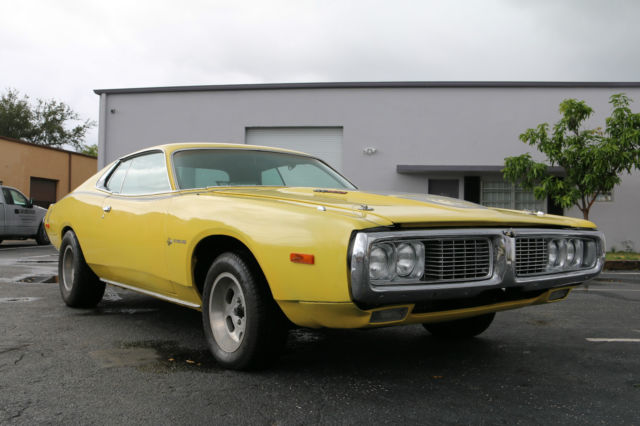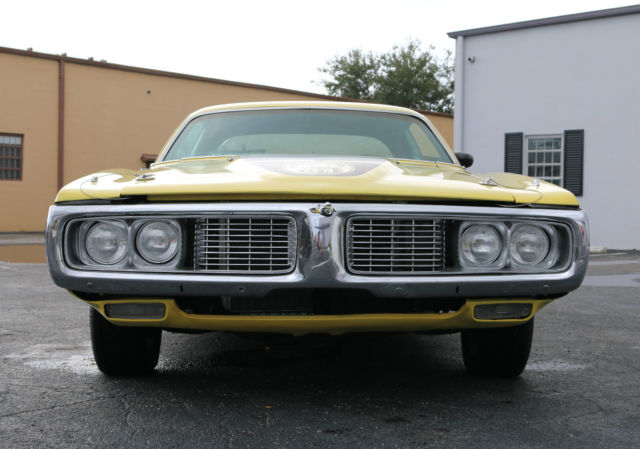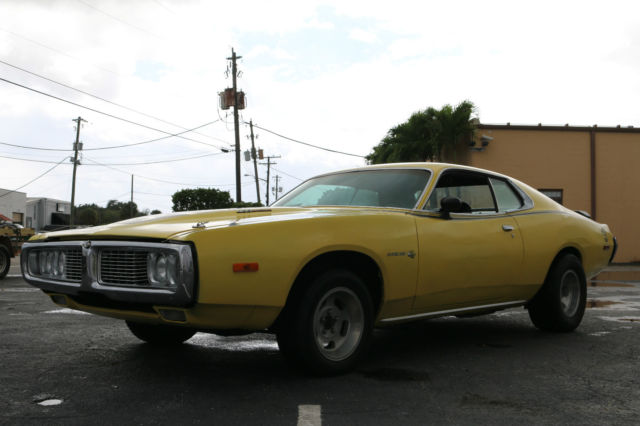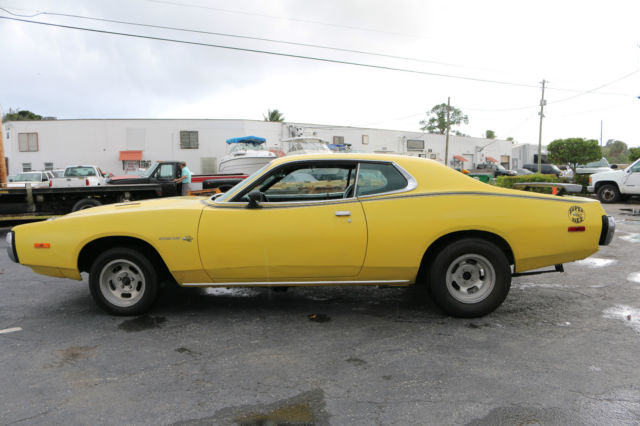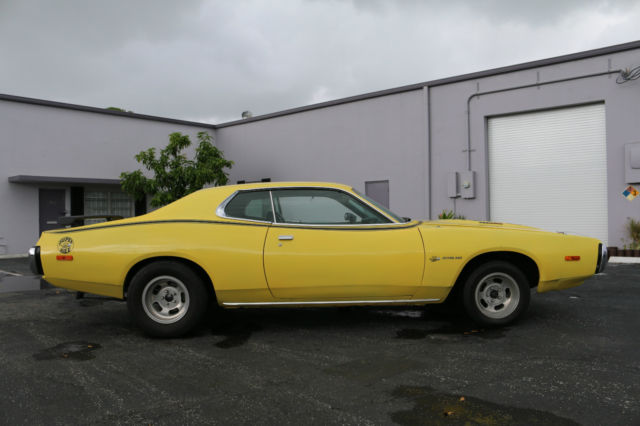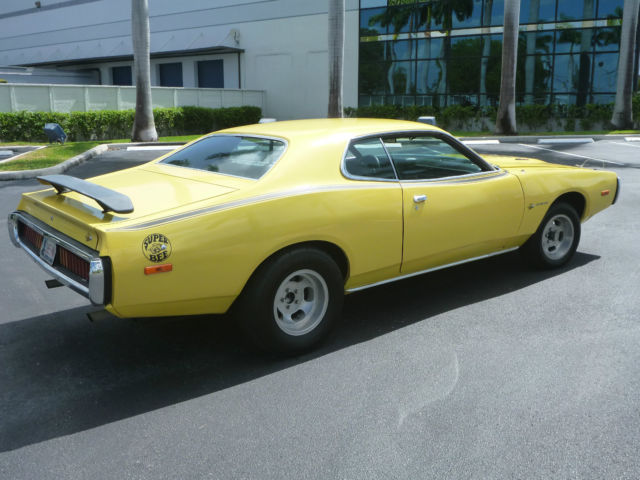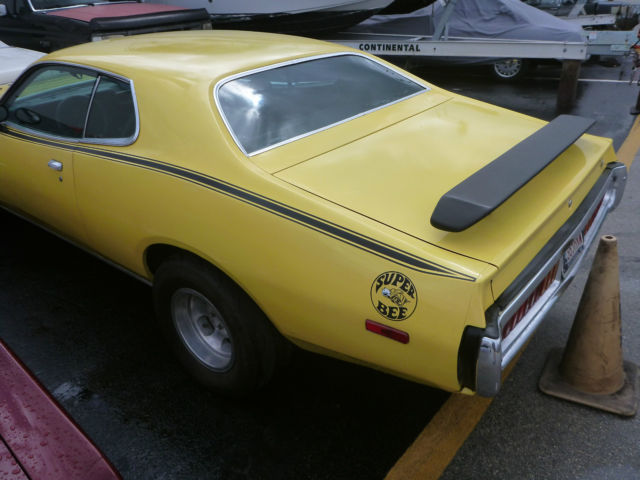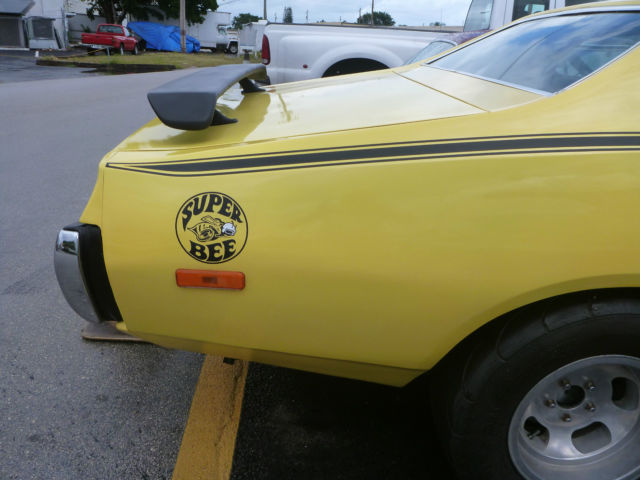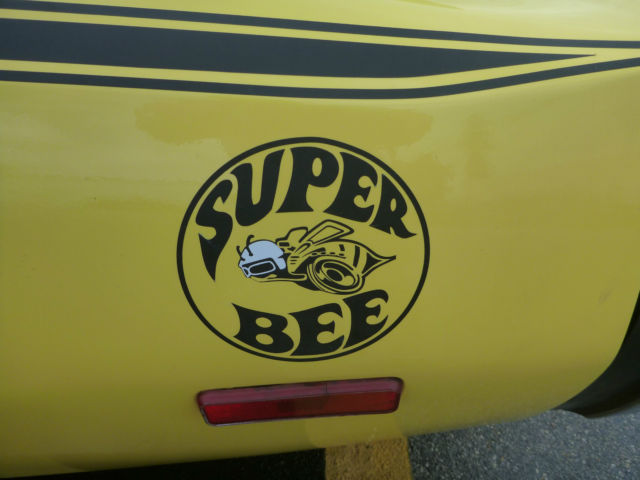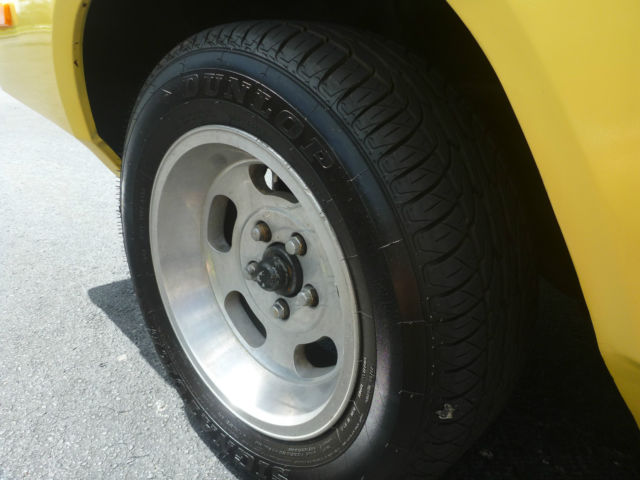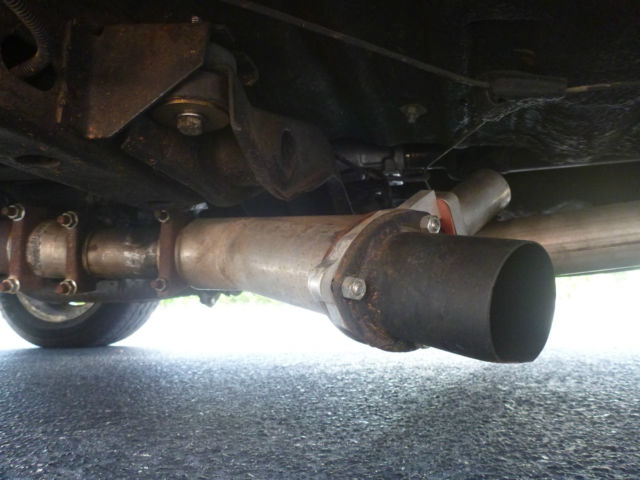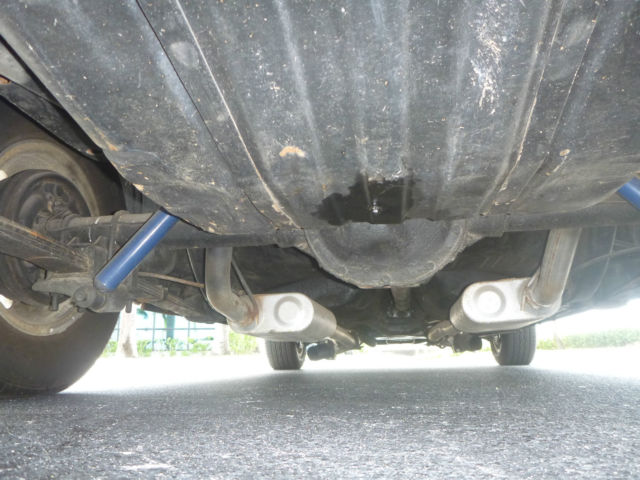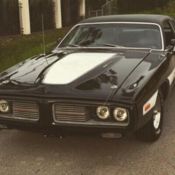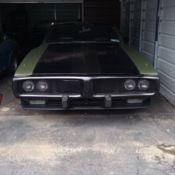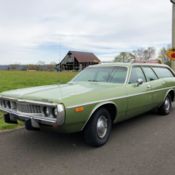1973 Dodge Charger SuperBee Tribute
Technical specifications of Dodge Charger 1973
| Price: | - |
|---|---|
| Item location: | Pompano Beach, Florida, United States |
| Make: | Dodge |
| Model: | Charger |
| SubModel: | Coronet |
| Type: | Coupe |
| Trim: | SuperBee |
| Year: | 1973 |
| Mileage: | 0 |
| VIN: | WH23M3A1***** |
| Color: | Yellow |
| Engine size: | 400 Magnum Super-Charged |
| Number of cylinders: | 8 |
| Power options: | Air Conditioning |
| Fuel: | Gasoline |
| Transmission: | Automatic |
| Drive type: | RWD |
| Interior color: | Black/wood |
| Options: | CD Player, Leather Seats |
| Vehicle Title: | Clear |
| You are interested? | Contact the seller! |
Description
Selling 1973 DODGE CORONET CHARGER SUPER-BEE TRIBUTE , with 400 Magnum ci 6.6LTS Mopar and transmission, with center console racing automatic-shift, MDS powerpack, Paxton super charger, new GT steering wheel racing model grip, cables, power brakes pump Hydro-vac, OEM rims, tires are good, B&M headers and oil pan, chrome all around engine, factory A/C car missing some components, new gas tank, fuel pump, etc, etc daily driver, new aluminum radiator and electro-fans, interior super clean and OEM, everything works, lights and all flow master exhaust, too many things to enumerate, this car runs flawlessly and drives smooth this's a head turner and has the header exhaust automatic switch for loud or normal however you like it ll with electric control, has bucket seats all OEM, new super-bee logo mats, new CD stereo with still OEM dash radio (disconnected). Over 20K invested in this beast, so make it yours for a fraction of the market price.REDUCED PRICE FOR A LIMITED TIME!!!
1973 DODGE CORONET CHARGER SUPER-BEE TRIBUTE VIDEO: CLICK HERE
1st/ 2nd STAGE MUFFLER COMPARISON VIDEO:CLICK HERE
- Yellow/black combination
- 1973 (YC code) Mopar 400cc. 6.7 V8 Magnum Cylinder Engine, has Paxton super charger
- Hydro-matic Automatic and brand new transmission
- Rare Yellow on Black color combination
- Reportedly stored for 1 year
- 1970's: 400in³ (6.6L) Big-Block V8, (4,800rpm,410ft-lbs torque 3,200 rpm) plus supercharger 25% more HP around 400 HP MOPAR power
Here is the brief History of this breed:
The original Dodge Super Bee was based on the Dodge Coronet two-door coupe, and was produced from 1968 until 1970.[5] It was Dodge's low-priced powerful muscle car and a rebadged version of the Plymouth Road Runner. The origin of the name, "Super Bee", has its basis in the "B" Body designation pertinent to Chrysler's mid-sized cars, including the Road Runner and Charger.[6]
Plymouth's Road Runner sales were enough to have Dodge Division General Manager, Robert McCurry, request a similar model from the Dodge Styling office. Senior designer, Harvey J. Winn, won a "contest" with the name "Super Bee" and a new logo design based on the Dodge "Scat Pack" Bee medallion.[7] The design of the first Super Bee was influenced by the 1968 Coronet convertible and the show car's interior was built by the Alexander Brothers. The show car was introduced at the 1968 Detroit Auto Show.[8]
Although the two cars are similar in external appearance, the Super Bee was slightly heavier (approx. 65lb (29kg)) and rode on a 117-inch (3,000mm) wheelbase compared to the Road Runner's 116in (290cm) wheelbase.[9][10] In addition to minor external differences, such as larger rear wheel openings, the bumblebee tailstripe and fancier grille, and the taillight ornamentation, the Super Bee also used actual diecast chrome-plated "Bee" medallions. These three-dimensional medallions were prominently mounted in a raised position in the grille/hood area and the trunklid/taillight area of the car throughout the first three years of production.[11]
The Super Bee used dash cluster from the Dodge Charger, while the four-speed manual cars received a Hurst Competition-Plus shifter with Hurst linkage;[6] this shifter compared to the Road Runner's less expensive Inland shifter and linkage.[12] Due to the higher-quality accessories attached to the Super Bee, the car was sold at a higher price in comparison to the Plymouth version and this had a negative effect on sales.[6]
The Super Bee was available with the Hemi engine.[13] This option raised the price by 33%, and only 125 were sold. The 1968 model was only sold as a two-door coupe, with two engine options, the base 335hp (250kW) 383 Magnum, and the 426 Hemi, rated at 425hp (317kW).[6]
The Super Bee included a heavy-duty suspension, an optional Mopar A-833 four-speed manual transmission, and high-performance tires.[14] Outside, a stripe (with the bee logo) was wrapped around the tail.[15]
A hardtop version joined the existing pillared coupe body in 1969 and a new optional twin-scooped air induction hood, the "Ramcharger", became available.[16] This particular option was coded N-96 and was the counterpart to the Plymouth Road Runner's "Coyote Duster" air induction hood. The "Ramcharger" hood featured forward-facing scoops.
A "six-pack" (three two-barrel carburetors) version of Dodge's 440 cubic-inch engine was added to the offering list mid-year. This option fell half-way between the standard engine and the Hemi as a USD463 option. The 1969 model year included the base 383 Magnum, 440 Six Pack, and the 426 Hemi. The 440 Magnum (4bbl) was reserved for the Coronet R/T.
For the 1970 model, the Super Bee received a redesign and a new front-end that consisted of a twin-looped front bumper that Dodge Public Relations referred to as "bumble bee wings".[17] Sales fell for the year from 15,506 in 1970 to 5,054 in 1971—because of, or in spite of, this new look, with another sales pressure coming from higher insurance rates for performance cars; the similar Plymouth Road Runner and Plymouth Duster both experienced similar sales issues.[18] In addition to the new looks, engine choices and "ramcharger" hood carried over from 1969, the 1970 cars from Dodge featured several new or improved options. For example, a "C- stripe" variant of the bumble stripe was offered, in addition to new high-back bucket seats, a steering column-mounted ignition and a "pistol-grip" Hurst shifter on four-speed models.[citation needed]
Engines:
- 1968–1970: 383in³ (6.3L) Big-Block V8, 335hp (250kW)
- 1968–1970: 426in³ (7.0L) Hemi V8, 425hp (317kW)
- 1969–1970: 440in³ (7.2L) Big-Block V8, 390hp (291kW)
Production:
1968: 7,842–7,717 (383), 125 (426 Hemi)1969: 27,800–25,727 (383), 1,907 (440 Six Pack), 166 (426 Hemi)1970: 15,506 1971| 1970–1971 |
| United States: Detroit, Michigan Hamtramck, Michigan Los Angeles, California St. Louis, Missouri |
| B-body |
| Dodge Coronet Plymouth Satellite Dodge Charger Plymouth Road Runner Plymouth GTX |
| 340cuin (5.6L) V8 383cuin (6.3L) V8 426cuin (7.0L) V8 440cuin (7.2L) V8 |
| 4-speed manual Torqueflite automatic |
The 1971 Coronet line were built in four-door sedan and station wagon body versions, the Super Bee model was moved to the platform used by the Charger. Since an R/T muscle car version of the Charger already existed, the Super Bee was promoted as the low-priced model in the line, selling at USD$3,271. Production numbers of the Super Bee reached 5,054, including 22 with the Hemi engine.[citation needed] The moniker was discontinued until the 2007 Super Bee, a Charger SRT-8.
1971 was the first and only year that a small block engine (340 4-bbl) became available in the Super Bee.[19]
Engines:
- 1971: 340in³ (5.6L) Small-Block V8, 275hp (205kW)
- 1971: 383in³ (6.3L) Big-Block V8, 300hp (224kW)
- 1971: 440in³ (7.2L) Big-Block V8, 370hp (275kW)
- 1971: 440in³ (7.2L) Big-Block V8, 385hp (287kW)
- 1971: 426in³ (7.0L) Hemi V8, 425hp (317kW)
- 1972: 400in³ (6.6L) Big-Block V8, 320 HP (4,800rpm,410ft-lbs torque 3,200 rpm)
